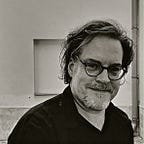Review: Marianne Faithfull and Her Rock Cabaret, a Survivor Thriving
By Bradley Bambarger <2005>
“I’m doing what I’m doing,” growled Marianne Faithfull, looking up from under her reading glasses at the Town Hall audience shouting requests for old tunes, almost right off. She added with a half-smile, “The only time in my life when I’m in control is when I’m up here — and I like it.”
What Faithfull was doing was limbering up her act in the second of five U.S. shows supporting her album Before the Poison. She needed her glasses to eye crib-sheets to the new songs, but Faithfull knew what she wanted, waving her arms to step up the band’s tempo and cuing ace trumpeter Lew Soloff with winks and nods.
Cutting a figure partway between old-school theater icon and bordello madam, the 58-year-old Faithfull had come to the stage dramatically, stepping slowly and brushing her hair back with exaggerated gestures. The bluesy opener “Trouble in Mind” was sultry rock cabaret, and if the singer is a bit ungainly these days — moving as if the spotlight were a patch of ice — she was in good voice, throaty as ever but strong.
Faithfull long ago outran her ’70s reputation as a celebrity drug casualty (and, before that, notoriety as Mick Jagger’s taboo-soiled angel) to occupy higher ground as an enterprising, avant-minded artist. Having come back from the abyss with erotically charged New Wave rock’n’roll, she went on to investigate the kindred-spirit world of Kurt Weill/Bertolt Brecht. Now she collaborates with the likes of Tom Waits, Nick Cave and P.J. Harvey.
Disappointing for fans of the poetic Before the Poison, Faithfull sang less than half of the disc — Harvey’s “The Mystery of Love” and “No Child of Mine,” Cave’s “Crazy Love” and Damon Albarn’s “Last Song.” The performances, though, were intriguingly different, simpler and more transparent than on record. Live, “Crazy Love” seemed to tax Faithfull’s sense of melody; but the singer was able to make the anti-lullaby “No Child of Mine” more personal than on record, but no less hypnotic.
Faithfull excavated ancient history with her Stones-penned ’60s hit “As Tears Go By,” which in her latter-day voice comes across as a grave, barely verbal exhalation of breath. After suppressing it for years, Faithfull also resurrected “Sister Morphine,” her lyrics set to Jagger’s music; on this night, she traded The Rolling Stones’ rootsy languor for death-bed drama.
The bulk of the show — and the band, led by guitarist Barry Reynolds and bassist Fernando Saunders — didn’t differ much from that documented by Faithfull’s 1990 New York live album, Blazing Away. Those fans calling out for older numbers were surely thrilled by the grand version of “Times Square” and a warm, lived-in rendition of Waits’ woozy Weill evocation “Strange Weather.” Faithfull’s intense, talking-blues take on John Lennon’s great “Working Class Hero” was another highlight. As so often through the night, Soloff’s solo in “Guilt” was a yowling marvel.
With the climactic one-two punch of the tense, edgy rocker “Broken English” and blunt reggae outburst “Why’d Ya Do It,” Faithfull played out the wrath of a woman scorned as if the wounds were still fresh. She was smiling, though, by the end — and if you couldn’t quite see the almost-innocent English girl of the ’60s in that big, charismatic smile any more, you could still see a hint of the dangerous late-’70s sexpot. But even that glimpse was wiped away, delightfully, with her last stage move — a grandmotherly hug with a young stage-jumping fan.
(Originally published in 2005 in The Star-Ledger of New Jersey.)
